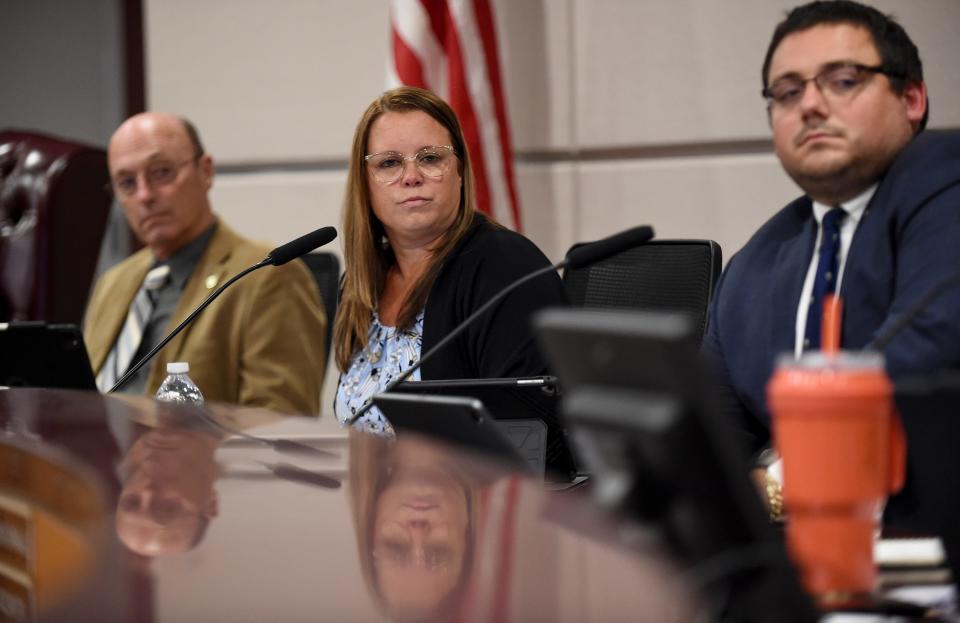A budget hearing's big reveal: Growth is costing Treasure Coast taxpayers a lot more money
Sometimes, great truths can be revealed during moments of adversity.
So it went during a Sept. 25 meeting while the Port St. Lucie City Council was giving final approval to the city's budget for the next fiscal year.
As they had at a previous hearing on the budget, local residents complained loudly about plans to increase taxes.
Council members countered that a modest drop in the city's millage rate amounted to a tax cut ― "the largest tax reduction of any of Florida's 20 largest cities," Councilman Anthony Bonna billed it ― even though property values have increased enough over the past year to translate into larger out-of-pocket tax bills for most local residents.

The city's official spin about the tax rate was disingenuous to the point of being comical.
"The City Council only controls the tax rate, not property values," city officials said in a news release issued after the meeting. "The property value is assessed annually by the Saint Lucie County Property Appraiser."
That would be Michelle Franklin, who could be forgiven for removing the city's leaders from her Christmas card list for throwing her under the bus like that.
Residents seemed to understand that the council, not Franklin's office, was responsible for raising their taxes. In fact, if it weren't for the property value increases that resulted from the work of Franklin's employees, the council might have had to (gasp) increase the millage rate or come up with some fairly significant spending reductions.
I'm glad residents weren't falling for "the sky is green" argument that a reduced millage rate is the same as an actual tax cut. But a genuine moment of truth arrived while Mayor Shannon Martin was explaining why the tax cut that wasn't really a tax cut was necessary.
She told residents the city needs increasing amounts of money to keep pace with growth. In doing so, she identified the financial house of cards that threatens cities and counties throughout Florida, including the Treasure Coast.

It's important to note Port St. Lucie city officials aren't the only ones using property value increases to politically paper over increases in government spending.
St. Lucie County is also dropping its millage rate, but not enough to offset the increased property assessments. Down the road in West Palm Beach, it's a similar story. For two straight years, West Palm has reduced its millage rates while approving employee pay raises.
Local government officials are truly holding the line on property taxes only when they adopt the so-called "rollback rate," which is the rate needed to produce the same amount of money as the prior year, excluding new construction.
State law requires local governments to disclose what their rollback rates would be, but governments aren't required to adopt those rates. As a result, many local governments set millage rates at or near what they were before, then reap windfalls generated by property value increases.

Martin's argument ― which, again, isn't unique to Port St. Lucie ― is that population growth increases demand for government services. To keep pace with that growth, cities and counties say they must keep spending more of taxpayers' money.
It's like a pyramid scheme. Growth is viewed as both the cause of and the solution to local governments' financial problems.
As long as cities and counties keep growing, the logic goes, property values will keep going up and that will finance additional government services.
Alas, as the rock band Kansas sang in "Dust in the Wind," nothing lasts forever but the earth and sky. Eventually, our real estate market will crash, as it did during the Great Recession of 2008 and 2009.
Some people assume the market will always rebound from those types of down cycles, but there's reason to be skeptical. Look at what has happened in the industrial cities of the Rust Belt, where out-migration has had a devastating impact over many decades.
At some point, people from other parts of the country may look at Florida and decide it's gotten too hot or too crowded to be a desirable place to live.
Then places like Wilmington, North Carolina, and Roanoke, Virginia, may be the "hot" communities trying to convince their residents millage rate reductions are really tax cuts when they're coupled with substantial property value increases ― while local governments along the Treasure Coast and elsewhere in Florida try to scrape by with austerity budgets.

It's not too late to head off this calamity, but it would take a strong showing of political will. Florida residents need to convince state legislators to ease some of the laws that rig the system in favor of growth and development.
For example, the state's growth management laws require cities and counties to adjust their comprehensive plans to account for expected increases in population growth.
Eliminating that requirement would be a good first step toward restoring a little more balance to the system. Cities and counties ought to decide for themselves how much growth they're willing to accommodate, without some state mandate shoving new development down their throats.
Otherwise, get ready for a world where local politicians can only boast about who increased your taxes the least. It's going to be tough to put smiley faces on that.
This column reflects the opinion of Blake Fontenay. Contact him via email at bfontenay@gannett.com or at 772-232-5424.
This article originally appeared on Treasure Coast Newspapers: Fast growth way more than inconvenience for Treasure Coast residents

